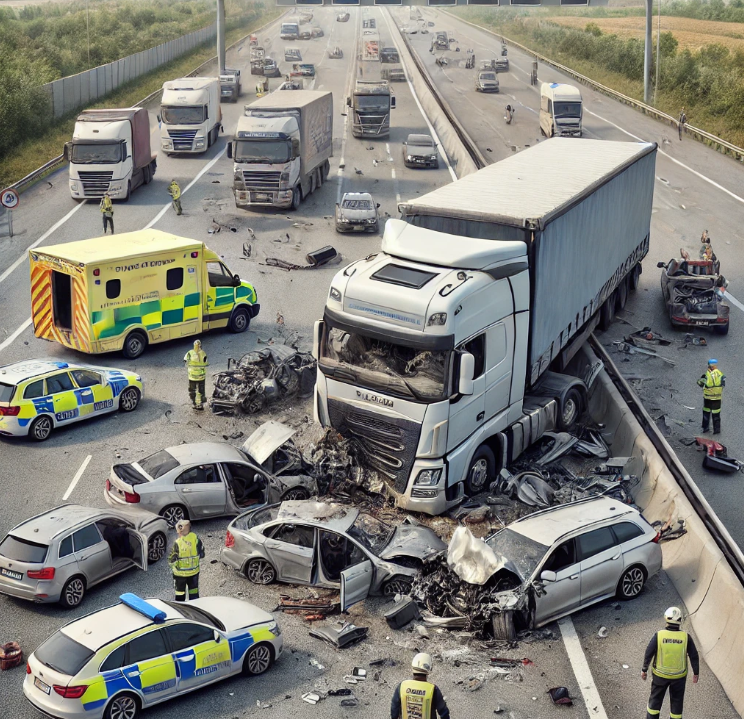
Truck accidents are a significant concern on highways and roads, with their large size and weight making them potentially devastating in collisions. These accidents not only lead to severe injuries and fatalities but also disrupt traffic flow, causing delays and increasing risks for other travelers. Understanding the impact of truck accidents on travel and learning key safety tips can help protect both drivers and passengers, ensuring safer journeys for everyone.
The Impact of Truck Accidents on Travel
Truck accidents affect the flow of traffic in several ways:
- Traffic Congestion: When a truck accident occurs, particularly on busy highways, the size of the truck and the extent of damage can lead to long delays. These delays are exacerbated by the time it takes to clear the accident scene, sometimes involving special equipment to remove large vehicles and debris.
- Secondary Accidents: Traffic congestion and sudden stops caused by a truck accident often lead to secondary accidents. Drivers not anticipating the slow-down or road closure may not react quickly enough, leading to rear-end collisions and other incidents.
- Road Closures: Severe truck accidents may require lane or full road closures for an extended period. In cases of hazardous material spills, roads may remain closed until it’s safe for vehicles to pass through, impacting thousands of commuters and travelers.
- Increased Risk for Other Drivers: During accident clean-ups and traffic redirections, drivers are often forced into narrow lanes or unfamiliar detours, which can increase stress and the likelihood of additional accidents.
Common Causes of Truck Accidents
Understanding the common causes of truck accidents can help travelers recognize and avoid potential hazards. Some of the most common factors include:
- Driver Fatigue: Truck drivers often work long hours, leading to fatigue and impaired reaction times. Falling asleep at the wheel or not being fully alert can result in serious accidents.
- Mechanical Failures: Poorly maintained trucks with faulty brakes, tires, or engine issues can pose serious dangers on the road.
- Improper Loading: Overloaded or improperly secured cargo can cause trucks to become unbalanced or difficult to control, especially at high speeds.
- Weather Conditions: Trucks, due to their size and weight, are more difficult to control in adverse weather conditions such as rain, snow, or fog, increasing the chances of accidents.
Safety Tips for Travelers
While the risk of encountering a truck accident is ever-present, following these safety tips can help ensure that you navigate the roads safely:
- Maintain Safe Following Distance: Trucks require more time to stop due to their size and weight. Always maintain a safe distance when driving behind a truck, especially on highways.
- Avoid Blind Spots: Trucks have large blind spots on both sides and directly behind them. Make sure to avoid driving in these areas, as truck drivers may not be able to see your vehicle.
- Be Cautious When Passing: When overtaking a truck, do so quickly and cautiously. Avoid lingering beside a truck, as high winds or sudden maneuvers can cause them to drift into your lane.
- Stay Alert in Bad Weather: Trucks are harder to maneuver in rain, snow, and fog. Reduce your speed and stay alert when driving near trucks in such conditions.
- Anticipate Wide Turns: Trucks require more space to make turns, particularly when turning right. Give them plenty of room to complete their maneuvers, and never attempt to squeeze between a truck and the curb.
- Avoid Distracted Driving: Always remain focused on the road when driving near large trucks. Distracted driving, even momentarily, can lead to dangerous situations, especially in the event of sudden stops or lane changes.
- Observe Speed Limits: Always adhere to posted speed limits, particularly in areas with high truck traffic. Speeding reduces your ability to react quickly to changing road conditions or truck movements.
What to Do in Case of a Truck Accident
In the unfortunate event that you are involved in or witness a truck accident, knowing how to respond can be critical. Follow these steps to stay safe:
- Stay Calm and Call for Help: Immediately contact emergency services to report the accident and provide any necessary details. If you’re not directly involved but witness the accident, avoid stopping in unsafe areas.
- Move to a Safe Area: If possible, move your vehicle out of traffic to avoid causing further accidents or obstructions.
- Assist Others: If it’s safe, check on other drivers and passengers involved. However, never attempt to move anyone who is injured unless they are in immediate danger.
- Document the Scene: If you’re involved in the accident, take pictures of the vehicles, damage, and road conditions for insurance purposes and to assist investigators.
Seek Legal Help After a Truck Accident
If you’re involved in a truck accident, it’s crucial to seek legal assistance to protect your rights and navigate the complex legal process. Truck accidents often involve multiple parties, including the driver, trucking company, and insurance providers, making it essential to have experienced professionals on your side. Consulting with truck accident lawyers can help ensure you receive the compensation and support needed for medical bills, vehicle repairs, and other damages.
Conclusion
Truck accidents pose significant risks to both traffic flow and driver safety. By staying informed about the potential dangers and following essential safety tips, travelers can reduce their chances of being involved in an accident. In the event of an accident, knowing how to respond and seeking the right legal help can make all the difference. Safe driving habits, combined with proper precautions, help ensure smoother, safer journeys. Additionally, after any road incident, keeping your vehicle in top shape is important—explore services like auto car detailing near me to maintain your car’s appearance and performance.





